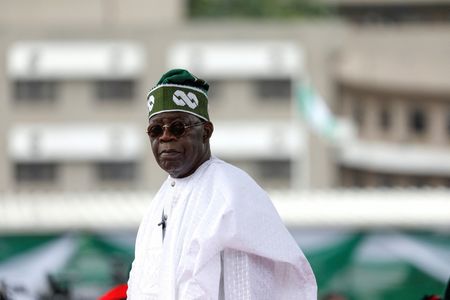By Felix Onuah
ABUJA (Reuters) – President Bola Tinubu on Wednesday announced an overhaul of Nigeria’s economic governance intended to ease financial hardship and boost productivity, establishing a multi-layered framework to bolster coordination, planning and implementation.
Tinubu, who took office last year, inherited an economy struggling with record debt, high unemployment, low oil output, and power shortages that have crimped growth.
But reforms he has implemented since then, chiefly ending a costly petrol subsidy and twice devaluing the naira currency within a year, have spurred price pressures and sparked the worst cost-of-living crisis in decades in Africa’s largest economy.
Central to the economic management structure is the creation of the Presidential Economic Coordination Council (PECC), chaired by Tinubu himself, his spokesperson Ajuri Ngelale said in a statement.
The PECC brings together 12 cabinet ministers and the central bank governor, alongside top economist Doyin Salami and prominent business leaders Aliko Dangote, Tony Elumelu and Funke Okpeke.
For immediate economic challenges, the president set up the Economic Management Team Emergency Taskforce (EET) which is headed by Finance Minister Wale Edun.
The taskforce, which unites cabinet ministers, the national security adviser, head of state oil firm NNPC Ltd., state governors and leading economists Bismarck Rewane and Suleyman Ndanusa, is mandated to develop and execute a six-month emergency economic plan within two weeks, Ngelale said.
The existing Economic Management Team (EMT) will be subsumed under the PECC and will primarily focus on long-term economic strategies after the EET’s six-month term ends.
“The formation of these teams complements existing structures like the National Economic Council,” Ngelale said.
(Writing by Elisha Bala-Gbogbo, Editing by William Maclean)










